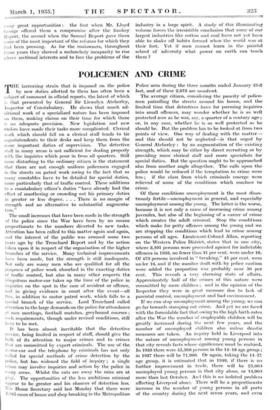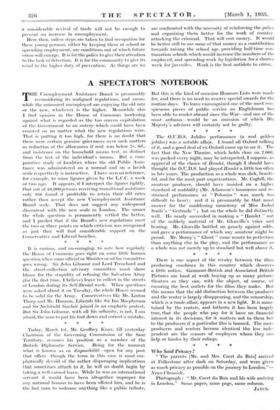POLICEMEN AND CRIME T HE increasing strain that is imposed on
the police by new duties allotted to them has often been a subject of comment in official reports, the latest of which that presented by General Sir Llewelyn Atcherley, Inspector of Constabulary. He shows that much ad- ditional work of a specialized nature has been imposed on them, making claims on their time for which there is no adequate provision. New legislation and new Orders have made their tasks more complicated. Clerical work which should fall on a clerical staff tends to tie superintendents to their desks and keep them from the. more important duties of supervision. The detective staff in many areas is not .sufficient for dealing properly with the inquiries which pour in from all quarters. Still more disturbing to the ordinary citizen is the statement that there are not enough uniform policemen engaged in the streets on patrol work owing to the fact that so many constables have to be detailed for special duties, more particularly that of traffic control. These additions to a constabulary officer's duties "have already had- the effect of smothering or crowding out his primary duties in greater or less degree. . . . There is no margin of strength and no alternative to substantial augmenta- tion."
The small increases that have been made in the strength of the police since the War have been by no means proportionate to the numbers diverted to new tasks. Attention has been called to this matter again and again, and the interest of the public was aroused some two years ago by the Trenchard Report and by the action taken upon it in respect of the-organization of the higher branches of the service. Many technical improvements have been made, but the strength is still inadequate. Not only are many men who are qualified for all the purposes of police work absorbed in the exacting duties of traffic control, but also in many other respects the • ubiquitous motor-car takes up the time- of the police in inquiries on the spot in the -case of accident or offence, and in. giving evidence in court after the event—all this, in addition to motor patrol work, which falls to a special branch of the service. Lord Trenchard called attention to the large demands on the police for attendance at race meetings, football matches,- greyhound courses ; such requirements, though under revised conditions, still - have to be met.
It has been almost inevitable that the detective service, being limited in respect of staff, should give the hulk of its attention to major crimes and to crimes that are committed by expert criminals. The use of the - motor-car and the telephone by criminals has not only called for special methods of crime detection by the police, but has -widened the field of inquiry ; a single crime may involve inquiries and action by. the police in many areas. Whilst the cats are away the mice are at play. The opportunities of the less ambitious criminal appear to. be- greater and his chances of detection less. The Home Secretary said last Monday that there were 3,085 cases of house and shop breaking in the Metropolitan Police area during the three months ended January 31st last, and of these 2,673 are unsolved.
The average citizen, considering the paucity of police- men patrolling the streets around his house, and the - limited time that detectives have for pursuing inquiries . into small offences, may wonder whether he is as well protected now as he was, say, a quarter of a century ago ; or, in any case, whether he is as well protected as he should be. But the problem has to be looked at from two points --of view. One way of dealing with the matter— and this should not be neglected—is that urged by General Ateherley : by an augmentation of the existing strength, which may be either by direct recruiting or by providing more clerical staff and more specialists for special duties. But the question ought to be approached also from another angle altogether. The calls upon the police would be reduced if the temptation to crime were • less ; • if the class from which criminals emerge were relieved of some of the conditions which conduce to crime.- Of these conditions unemployment is the most disas- trously fertile—unemployment in general, and especially unemployment among the young. The latter is the worse, because it is not only a cause of increasing crime among juveniles, but • also of -the beginning of a career of crime which creates the adult criminal. Stop the conditions which make for petty offences among the -young and we . are stopping the conditions which lead to crime among persons of all ages. Lieutenant-Colonel Allan, reporting on the Western Police District, states that in one city, where 3,101 persons were proceeded against for indictable offences in 1933, no fewer than 31 per cent. were under 16. Of 473 persons involved in " breaking," 45 per cent. were under 16, and if the number dealt with by police caution were added the proportion was probably near 50 per cent. This reveals a very alarming state of affairs. Approximately half of the crimes of this nature were committed by mere children ; and in the opinion of the Inspector they were in great measure due to lack of parental control, unemployment and bad environment.
If we can stop unemployment among the young; we can go far towards stamping out crime. And yet we are faced with the formidable fact that owing to the high birth-rates after the War the number of employable children will be greatly increased during the next few years, and the number of unemployed children also unless drastic measures are taken. An inquiry held in Liverpool into the nature of unemployment among young persons in that city reveals facts whose significance must be realized- In 1933 there were 55,500 persons in the 14-18 age group ; in- 1937 there will be 71,000. Or again, taking the 14-21 age group, it is estimated that in 1940, if there is no - further improvement in trade, there will be 25,003 unemployed young persons in that city alone, or 14,009 more than last October. And this is no isolated problem affecting Liverpool alone. There will be a proportionate increase in the number of young persons in all parts of the country during the next seven years,- and - even a considerable revival of trade will not be enough to prevent an increase in unemployment.
Here then, unless steps are taken to find occupation for these young persons, either by keeping them at school or spreading employment, are conditions out of which future crime will emerge. It is for the police to give their attention to the task of detection. It is for the community to give its mind to the higher duty of prevention. As things are we are confronted with the necessity of reinforcing the police and organizing thefn better for the work of counter attacking the criminal. That will cost money. It would be better still to use some of that money as a contribution towards raising the school age, providing half-time con- tinuation schools which would increase the numbers of the employed, and spreading work by legislation for a shorter week for juveniles. Work is the best antidote to crime.



























































 Previous page
Previous page